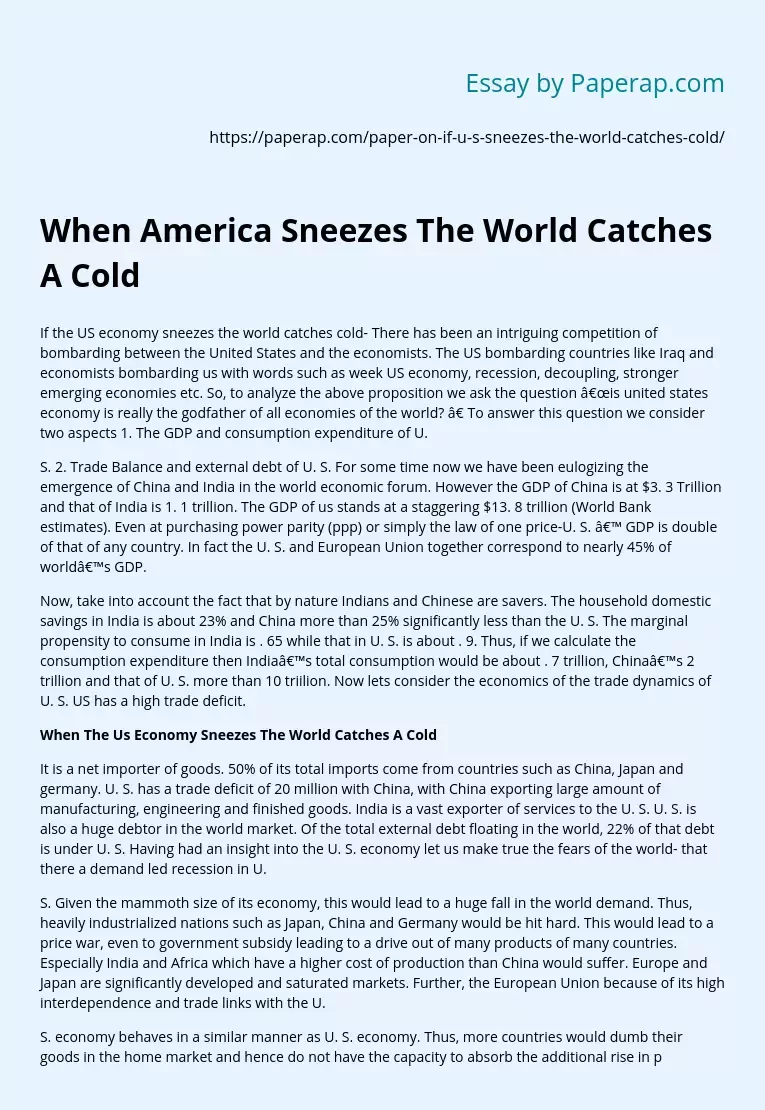When America Sneezes The World Catches A Cold
If the US economy sneezes the world catches cold- There has been an intriguing competition of bombarding between the United States and the economists. The US bombarding countries like Iraq and economists bombarding us with words such as week US economy, recession, decoupling, stronger emerging economies etc. So, to analyze the above proposition we ask the question “is united states economy is really the godfather of all economies of the world? ” To answer this question we consider two aspects 1. The GDP and consumption expenditure of U.
S. 2. Trade Balance and external debt of U. S. For some time now we have been eulogizing the emergence of China and India in the world economic forum. However the GDP of China is at $3. 3 Trillion and that of India is 1. 1 trillion. The GDP of us stands at a staggering $13. 8 trillion (World Bank estimates). Even at purchasing power parity (ppp) or simply the law of one price-U. S. ’ GDP is double of that of any country.
In fact the U. S. and European Union together correspond to nearly 45% of world’s GDP.
Now, take into account the fact that by nature Indians and Chinese are savers. The household domestic savings in India is about 23% and China more than 25% significantly less than the U. S. The marginal propensity to consume in India is . 65 while that in U. S. is about . 9. Thus, if we calculate the consumption expenditure then India’s total consumption would be about . 7 trillion, China’s 2 trillion and that of U. S. more than 10 triilion.
Now lets consider the economics of the trade dynamics of U. S. US has a high trade deficit.
When The Us Economy Sneezes The World Catches A Cold
It is a net importer of goods. 50% of its total imports come from countries such as China, Japan and germany. U. S. has a trade deficit of 20 million with China, with China exporting large amount of manufacturing, engineering and finished goods. India is a vast exporter of services to the U. S. U. S. is also a huge debtor in the world market. Of the total external debt floating in the world, 22% of that debt is under U. S. Having had an insight into the U. S. economy let us make true the fears of the world- that there a demand led recession in U.
S. Given the mammoth size of its economy, this would lead to a huge fall in the world demand. Thus, heavily industrialized nations such as Japan, China and Germany would be hit hard. This would lead to a price war, even to government subsidy leading to a drive out of many products of many countries. Especially India and Africa which have a higher cost of production than China would suffer. Europe and Japan are significantly developed and saturated markets. Further, the European Union because of its high interdependence and trade links with the U.
S. economy behaves in a similar manner as U. S. economy. Thus, more countries would dumb their goods in the home market and hence do not have the capacity to absorb the additional rise in production. This would in turn lead to a fall in production. Even the service sector would be see large scale loss in jobs. Already with the low growth scenario for the previous three fiscals, we have seen large scale cut in jobs in the IT sector in U. S. and even countries exporting services such as India. Add to it the political hegemony of U. S. nd a worldwide recession seems inevitable. Empirically we have seen a fall in the US growth rates been coupled with a fall in the world gdp growth rate by 2%-3%. So as of today the above proposition seems to hold true. However a significant question to ask here whether the U. S. economy is strong enough to continue its economic hegemony. The us economy has been tremendously resilient in the past century and that is why it has had such an economic influence on the world. For no war or political turmoil had a long lasting effect on the U. S. economy.
However, the B-R-I-C countries and especially China will in future surely challenge that. Here again the dynamics are intriguing. For china will be first country since World War II to challenge the US on three independent spheres- economic, political and military. On the economic sphere China’s economy has doubled over the past decade and it is increasingly tapping new resources, liberalizing trade, finding new markets such as Africa and Latin America. The major constraint that the Chinese economy faces is that high inflation (18%-20%) and low domestic demand mobilization.
Hence most of its production is export oriented. However given the track record of the double digit growth rates that the Chinese economy has been recording it seems quite inevitable that the Chinese economy will soon challenge the U. S. add to it a stronger Indian economy and we could see a reorientation of economic power, a shift eastwards. And then the next question is what the shift in power dynamics would be like-for in history we have seen countries waging war to overthrow empires and superpowers.
However with the kind of nuclear power that the countries posses today, a war seems not very reasonable. So then would “the road to the east run through the west”, that is US be giving China, India more space in the UNO to formulate its policies,theG8 countries expand to include the emerging China, India. Or would the US resent and sneeze for the world to catch another cold (War)? Reference: Foreign Affairs (Jan/Feb 08)- Richardson- Huckabee English. pravda. ru
When America Sneezes The World Catches A Cold. (2019, Dec 05). Retrieved from https://paperap.com/paper-on-if-u-s-sneezes-the-world-catches-cold/

